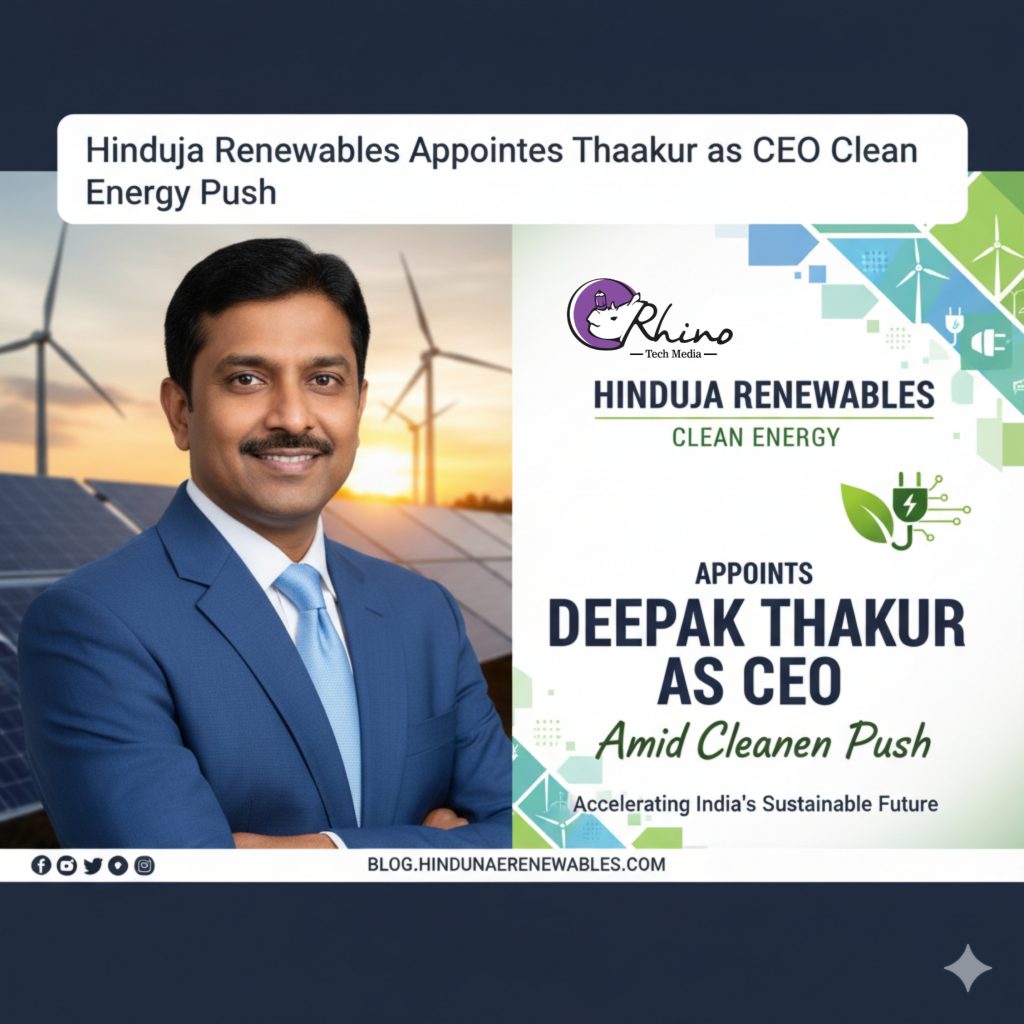Introduction
In October 2025, Hinduja Renewables Energy Pvt Ltd (HREPL), part of the Hinduja Group, announced the appointment of Deepak Thakur as its new Managing Director and Chief Executive Officer, effective October 1. This change in leadership comes at a pivotal moment, as Hinduja Renewables is gearing up to accelerate its growth in India’s dynamic renewable energy sector.
This essay explores the background of the appointment, Deepak Thakur’s credentials, the motivations behind this move, and the potential implications for both the company and the clean energy landscape in India.
Background & Strategic Context
Hinduja’s Renewables Ambitions
Hinduja Renewables currently operates a renewable energy portfolio of about 3 GW, spread across states like Tamil Nadu, Maharashtra, Rajasthan, Gujarat, Uttarakhand, Karnataka, and Delhi–NCR. The company’s power generation is backed by long-term power purchase agreements (PPAs) with central agencies such as Solar Energy Corporation of India (SECI) and NTPC.
However, the Hinduja Group has more ambitious targets. It aims to triple that capacity to over 10 GW by 2030, and expects to invest about USD 3-4 billion in capital expenditure to support this expansion. The scale and speed of this planned growth require strong leadership, operational excellence, and access to capital.
Leadership Transition
Deepak Thakur succeeds Sumit Pandey, who had led the company through its formative growth phase and has now stepped down. The shift can be seen as a natural evolution—from a founder/early growth leadership phase to one oriented toward scaling, consolidation, and execution.
The move signals that Hinduja Renewables is entering its next stage: one where scaling up, managing operational complexity, integrating newer technologies, and optimizing asset monetization (e.g. via InvITs) will be key.
Profile of Deepak Thakur
Deepak Thakur brings over 30 years of experience in sectors such as renewable energy, infrastructure, industrial products, and electronics. He has held senior leadership roles in major companies including:
- Mahindra Group
- Reliance
- Sterling & Wilson
- L&T
- Honeywell
- Thermax
His expertise spans across the full renewable energy value chain: from project development, engineering, procurement & construction (EPC), operations & maintenance (O&M), upstream technology & manufacturing, to asset monetization via Infrastructure Investment Trusts (InvITs).
In academia, he holds a bachelor’s degree in Mechanical Engineering from the University of Pune and an MBA from Symbiosis Institute of Business Management.
An interesting facet of his experience is involvement in India’s policy efforts: he contributed to the formulation of India’s National Solar Thermal Policy in 2009, helping lay early foundations for the country’s clean energy roadmap.
Thakur himself commented on his new role by stating:
“The group’s deep commitment to renewables aligns strongly with India’s energy transition and I look forward to being part of this exciting journey of impact and growth.”
Motivations and Strategic Significance
Need for Execution Leadership
To reach the 10 GW target by 2030, Hinduja Renewables must transition from growth mode to execution mode. This involves complex challenges—not just in project development, but in securing financing, managing regulatory risk, optimizing operations, and ensuring profitability under varying tariffs and grid conditions. Having a leader like Thakur, with hands-on experience across the value chain, positions the company to navigate those challenges.
Focus on Value Monetization
Given that Thakur’s portfolio includes experience in monetization via InvITs and asset optimization, his leadership may emphasize unlocking value from completed assets, possibly through structured financial instruments. This could help Hinduja free up capital for further expansion or reduce risk exposure.
Signaling to Investors and Stakeholders
Leadership changes often serve as signals to investors, lenders, regulators, and partners. Appointing a seasoned industry executive reassures stakeholders that Hinduja is serious about delivering on its ambitious plans and is ready to move from intention to impact.
Challenges & Risks Ahead
While the appointment is a strategic step forward, Hinduja Renewables faces several challenges:
- Financing risk: Raising USD 3–4 billion is nontrivial. The company will need to structure deals across equity, debt, and possibly hybrid instruments, balancing risk and return.
- Regulatory & Policy Uncertainty: India’s renewable energy sector is subject to evolving policies, tariffs, grid regulations, and subsidy regimes. Navigating these changes will be critical.
- Operational execution: Scaling from 3 GW to 10 GW will strain project management, supply chain, and manpower capacities. Ensuring consistent quality, cost control, timely commissioning, and O&M effectiveness will be key.
- Market competition & pricing pressure: The renewable sector in India is becoming increasingly crowded. Differentiation will depend on cost competitiveness, technological innovation (storage, hybrid systems), and efficient operations.
- Asset monetization timing: While monetizing via InvITs or sale of operational assets can generate liquidity, doing so too early may hamper control or future earnings.
Potential Impacts & Outlook
If managed well, Thakur’s leadership could unlock several benefits:
- A faster, more disciplined expansion of capacity toward the 10 GW goal.
- Improved operational efficiency and lower cost of energy.
- Better financial structuring and access to capital markets.
- Enhanced credibility in the market, leading to stronger partnerships, alliances, and bidding success.
- Contribution to India’s broader energy transition goals by adding clean capacity at scale.
In the medium to long term, if Hinduja executes effectively, it could emerge as one of India’s more influential independent renewable power producers.
Conclusion
The appointment of Deepak Thakur as Managing Director & CEO of Hinduja Renewables is timely and strategic. As the company shifts from foundational growth to scaling and consolidation, leadership with a proven track record across technical, operational, and financial domains is critical. Thakur’s domain experience, coupled with Hinduja’s capital backing and ambition, positions the company to take on the challenges of rapid expansion in India’s competitive renewable energy landscape.
However, the success of this transition will depend heavily on execution—raising capital, managing regulatory risk, operational excellence, and monetizing assets prudently. If Hinduja can surmount these challenges, the Thakur-led phase may well be the one that defines its standing in India’s clean energy future.

